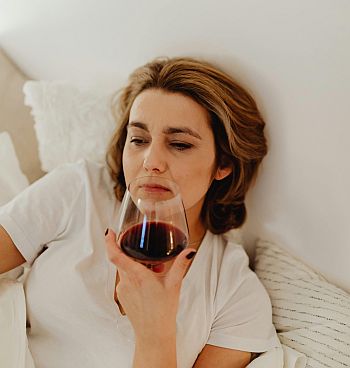Last Updated on March 27, 2025 by Bertrand Clarke
It’s 3 a.m., and the house is silent—except for the soft shuffle of feet making their way to the bathroom. For millions of people, this nocturnal ritual has become an unwelcome part of life. Waking up to urinate, known as nocturia, isn’t just a minor inconvenience; it’s a widespread phenomenon that disrupts sleep, saps energy, and, in some cases, hints at hidden health concerns. Far from being a simple quirk of aging, the reasons behind these midnight treks are as varied as the people experiencing them. So, what’s really going on when the call of nature pulls you out of bed?
The answer isn’t as straightforward as a full bladder. While it’s tempting to point the finger at that extra glass of water before bed, nocturia often stems from a complex interplay of habits, biology, and even modern medicine. Take hydration, for starters. It’s not just about how much you drink but what and when. That soothing cup of chamomile tea or a late-night beer might seem like a ticket to relaxation, but both can act as diuretics, ramping up urine production just as you’re trying to wind down. Even healthy habits—like a bowl of watermelon or a hearty vegetable soup for dinner—can flood your system with water-rich foods, setting the stage for a restless night.
Timing matters, too. Gulping fluids right before bed gives your kidneys little chance to process them before you’re horizontal, leaving your bladder to bear the brunt. Experts suggest tapering off liquids a couple of hours before sleep, a small tweak that can make a big difference. But if you’ve already cut back on evening drinks and still find yourself padding to the bathroom, the plot thickens. Your body might be telling a different story—one written in hormones, sleep patterns, or even the pills in your medicine cabinet.
As we age, our internal chemistry shifts in ways that can turn a good night’s sleep into a distant memory. One key player is the antidiuretic hormone (ADH), which tells your kidneys to slow urine production overnight. In youth, ADH keeps things in check, but with time, its levels drop, leaving your kidneys churning out more liquid than your bladder can comfortably hold. For women, menopause adds another layer: declining estrogen can weaken pelvic muscles and shrink bladder capacity, making every drop feel urgent. Men, meanwhile, face their own hormonal hurdle as prostate growth—spurred by changes in testosterone—squeezes the urethra, triggering frequent trips that often leave the bladder half-full.
But it’s not always about aging gracefully—or not. Sometimes, nocturia is a red flag waving over deeper waters. High blood pressure, for instance, can throw off your body’s fluid balance, especially at night, sending excess urine your way. Diabetes, too, plays a sneaky role: when blood sugar spikes, your kidneys work overtime to flush it out, dragging you along for the ride. Then there’s sleep apnea, a condition that’s often misread as a bladder problem. The interrupted breathing it causes can jolt your system into producing more urine, turning a sleep disorder into a bathroom marathon. If snoring, fatigue, or a racing heart tag along with your nighttime wake-ups, it’s worth a closer look.
Medications can also tip the scales. Diuretics, prescribed for everything from hypertension to heart failure, are notorious for boosting urine output—helpful by day, disruptive by night. Other drugs, like antidepressants or calcium channel blockers, might subtly shift your fluid dynamics or bladder control, nudging you awake when you’d rather be dreaming. A simple fix? Talk to your doctor about timing those doses earlier or adjusting the regimen. It’s a low-effort move that could reclaim your uninterrupted slumber.
Then there’s the sleep itself. As the years pile on, deep REM sleep—the kind that keeps you blissfully unaware of a filling bladder—starts to fade. Light sleep takes over, and suddenly, every creak, every twinge, every minor urge can rouse you. What feels like a bladder emergency might just be your brain seizing the moment to say, “Hey, while you’re up…” Improving sleep hygiene—think dark rooms, cool sheets, and no screens—can help you sink deeper into rest, letting those subtle signals slide by unnoticed.
For many, nocturia is a puzzle with a mundane solution: tweak your habits, and the problem fades. But when it lingers, it’s more than a nuisance—it’s a wake-up call. Chronic sleep disruption doesn’t just leave you groggy; it chips away at your mood, your focus, and even your long-term health. Studies link poor sleep to everything from weight gain to heart disease, making those midnight jaunts a bigger deal than they seem. And if an underlying condition is at play—be it prostate trouble, diabetes, or apnea—catching it early can be a game-changer.
So, next time you’re bleary-eyed at the bathroom sink, don’t just shrug it off as “one of those things.” Keep a mental note—or better yet, a diary—of what you ate, drank, and felt that day. Skip the late-night latte, swap the soup for something solid, and see if the pattern shifts. If it doesn’t, dig deeper. Your body’s not shy about sending messages; it’s up to you to listen. After all, a good night’s sleep isn’t just a luxury—it’s a necessity. And on March 26, 2025, as the world hums along, solving this midnight mystery might just be the key to reclaiming yours.










